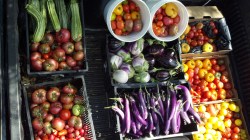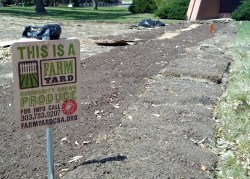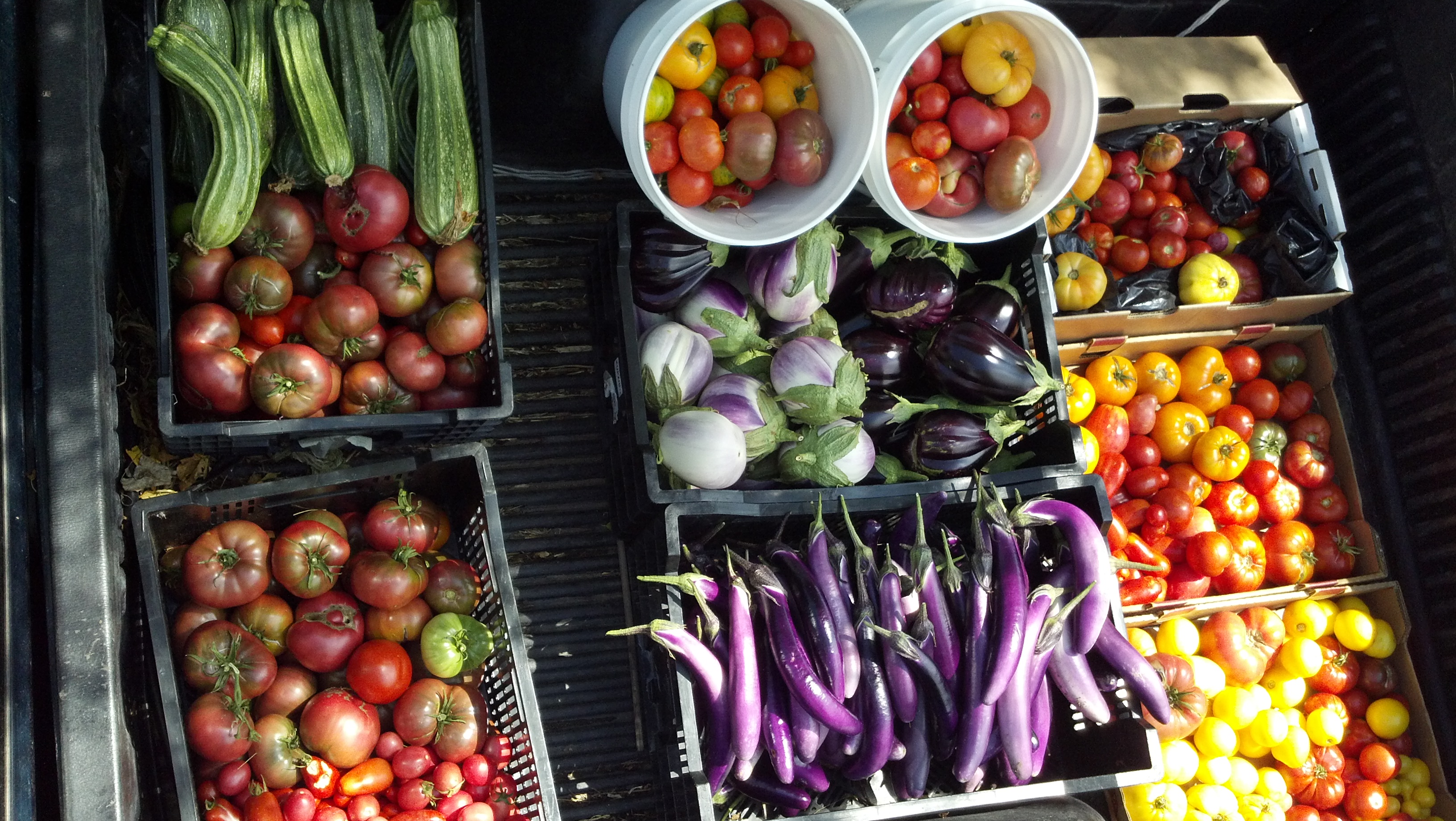
One truck bed full of Debbie’s front yard vegetables.
Debbie Dalrymple and I are harvesting apples from a big backyard tree in Denver’s dense Washington Park neighborhood. Debbie does a lot of guerrilla harvesting throughout the neighborhood, and always with enthusiasm. While I stick to ladders, she climbs around in the tree, standing on branches and reaching for the very best treetop apples. She has a fruit obsession, she says, often stopping by houses with big trees to make sure the fruit will be harvested. A lot of homeowners, it seems, are happy to have her pick their fruit to give to her customers rather than waste it.
Five years ago, Debbie started Farm Yard CSA. It’s similar to a traditional community-supported agriculture (CSA) scheme, but rather than source all the food from a single farm outside the city, or even a few coordinated larger farms, hers is a neighborhood CSA. All Farm Yard produce grows in front and backyards within a five-mile radius of her house. Debbie’s house is a half-block from my house, and I’ve been enjoying walking to pick up my fresh produce all summer and fall.
Urban CSAs are a growing part of the larger CSA movement. Many urban gardens, such as Fresh Roots in Vancouver, B.C., claim unused lots in urban spaces and basically operate like their rural cousins. But garden and yard CSAs, such as My Farm in San Francisco, which had up to 59 yards in its heyday, and Community Roots in Boulder, have failed or struggled financially.

Still, overhead can be significantly lower in neighborhood CSAs that do not have to lease land and equipment. Fossil-fuel consumption for Farm Yard is pretty low too, but not zero, says Debbie. “I had this friend build me a really special bike trailer, but it’s almost impossible to move this much produce on a bike,” she laments, gesturing to the truckload of squash we’d harvested before the apples. On this day, having been to three gardens in her Ford truck and filled it up twice, I could see there was no way to do this on a bike. Still, this produce is darned local, and the carbon footprint of the CSA is about as small as you can get outside of growing your food in your own garden, which is how Farm Yard started.
“I just decided to change my lawn into a garden,” Debbie recalls. Then a friend suggested she turn her yard-garden approach into a business and helped for the first year. After the first year, Debbie began running Farm Yard on her own, and she’s been doing it ever since, usually with help from one exchange worker, plus a few volunteer members who give a few hours here and there.
Cory Bogus is this year’s volunteer extraordinaire. Once we fill all our baskets and boxes with apples, we head to Devil’s Food Bakery on South Gaylord Street to pick him up. Cory is a soon-to-be Peace Corps volunteer who is a barista at Devil’s Food as well as Debbie’s main farmhand at Farm Yard. He volunteers at Farm Yard to get some agricultural experience that he’ll use in his upcoming job in Madagascar. Cory and I discuss local coffee roasters while Debbie gets a pastry and we head off to the next garden. Debbie’s been harvesting since 7 a.m. It’s 3 p.m. and this is lunch. She doesn’t eat or sleep much in summer.
“I have the energy. I don’t have a TV. This is how I entertain myself,” she explains with a smile.
In past years, she has relied on World Wide Opportunities on Organic Farms (WWOOF), an organization that links organic farms with volunteer workers. She gives a worker a room in her house and provides plenty of produce to eat all summer. And the volunteer provides full-time labor in exchange.
Most members come to her through a listing on the Local Harvest website or through word-of-mouth. This year she has 58 members. She has farmed in as many as 25 yards but now has only 12.
Debbie says a few other small yard CSAs exist in Denver neighborhoods, and some offer meat and eggs. (It’s now legal to have farm animals such as chickens and goats within the city limits.) Many are casual and informal, almost like a group of friends. They’re not listed on the Community Harvest or official CSA sites and they’re not trying to make a profit.
The small nature of Farm Yard and other grassroots neighborhood farming could be the secret to their success.
“I always operate in the black, but I don’t pay myself a salary. Maybe I could pay my mortgage if I had more yards,” says Debbie. (She has a full-time job as an IT consultant.) “But, when things get really big, they usually get kind of bad.”
Each year she adjusts her strategy to make the CSA work a little better. Now, instead of getting bigger, she’s toying with the idea of making Farm Yard happen all within 10 blocks. “It would kind of almost be like a group of friends. We’d eliminate the mad rush to distribution day. I’d just send out a daily harvest email and people could come by any day and grab stuff off my porch. I might like it to be a little more casual so it incorporates into my life better, ” she says. “If I keep it small, I know everyone I grow for. Then, we get to eat together all year long.”


